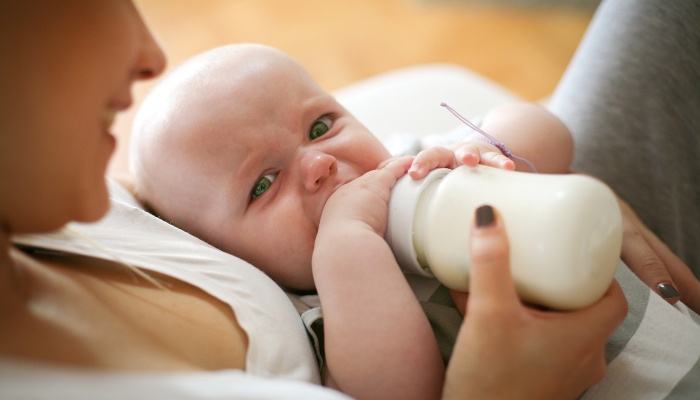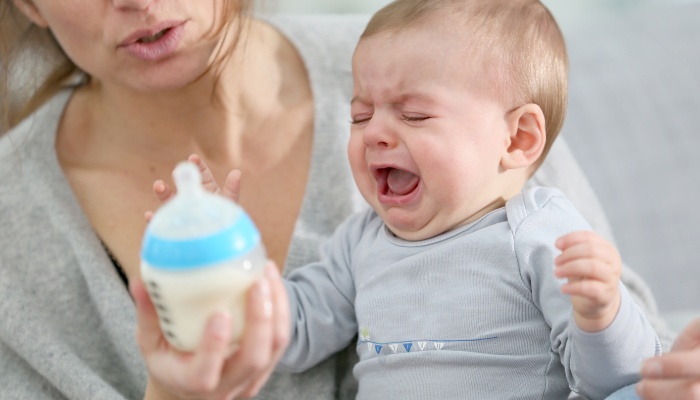Your child may eventually develop a healthy appetite and eat quickly, but currently, they seem to struggle with feeding from the bottle. Even when you know they are hungry, they still seem to resist. What could be causing this behavior?
Why does my baby fight the bottle even when hungry? Babies commonly experience a phase of refusing the bottle despite being hungry. This is often caused by things like weaning from the breast, overtiredness, incorrect nipple size, milk temperature, etc., and it will usually resolve itself when these changes are addressed.
It can be deeply frustrating and worrying when your little one seems to refuse one of their basic needs, but with patience and experimenting with different options, you’ll get there.
To help take some of the guesswork out of this issue, we’ll look at 14 possible reasons behind bottle aversion, what to do, and when to see a doctor.
Why Baby Fights Bottle (Even if Hungry)
It’s difficult when your baby can’t yet clearly communicate their preferences.
There are a few possible explanations behind why they might be resisting the bottle when hungry though — let’s see if any of these ring true for you…
1. Needs To Burp
All babies feed slightly differently, and some may need burping after a feed, while others may need to take a short break in the middle of feeds to be burped.
If they seem uncomfortable or distressed during the feed, babies will typically squirm or pull away from the bottle.
Stop to burp them by keeping them upright and gently rubbing or patting them on the back and up to the shoulders to help work out some gas.
2. Wrong Nipple Size
Bottle nipples/teats come in all shapes and sizes to suit babies of different ages and sucking abilities, so it could be that the nipple size is mismatched for your little one (too long, too short, etc.).
Sizes are made from preemie age all the way up to 9 months and beyond. Check out this guide to make sure you have the most appropriate one for your baby.
3. Nipple Flow Issues
Some bottle nipples have different flow speeds, so the milk that is being delivered to your baby too slowly or too fast can make meal times a frustrating and unpleasant experience for them.
Some babies have different sucking abilities, so you may find that your young baby prefers a faster flow than is recommended.
Speak to your pediatrician about which nipple style may be best for them, and experiment until you find the right one.
4. Nipple Is Collapsing
Most baby bottles have a venting system that helps maintain a neutral balance of air pressure, no matter how tightly the nipple ring is screwed on.
In non-vented baby bottles, however, babies have to work harder to suck the milk out, causing the nipple to collapse.
Consider purchasing a vented bottle, and in the meantime, stop to burp your baby to give the air pressure in the bottle a chance to neutralize.
5. Prefers To Be Breastfed
Bottle feeding feels very different and requires a different kind of sucking action from your baby, so they could be finding the transition from breast to bottle too strange.
Try using a very soft and flexible bottle nipple to best replicate the real thing, and hold baby a little closer to you to help them feel secure. It can take time, so keep persisting.

6. Milk Too Hot or Cold
When your baby is accustomed to body-temperature milk from you, it can feel alien to drink milk or formula that is slightly cooler or warmer than this.
Breast milk is typically lukewarm, so try warming their bottle “to around 98.6 °F so it’s just around the average body temperature” advises lactation consultant Michelle Roth.
7. Recent Formula Change
Each brand of formula has different taste characteristics. Some are quite sweet while others may have a cereal-type taste or even be a little sour or bitter, which won’t be a fun change for them!
Switch temporarily back to breast milk or their regular formula, and try experimenting with a different formula, perhaps one that shares very similar ingredients with their old formula.
8. Constipated
A lack of fluids and switching from breast milk to formula can often cause constipation as formula is a little harder to digest, leaving little tummies too upset to accept the bottle.
Ensure you are using the recommended amount of formula powder stated on the packaging, and try offering your baby extra water between feeds.
9. Overtired
When your baby is overly fatigued, they’ll reach a point where they could be too irritable and restless to concentrate on feeding even if they want to.
Try feeding a little earlier than usual, or set up a more flexible feeding and sleeping schedule to ensure they get enough sleep.
10. Uncomfortable Position
A very common cause for bottle refusal comes down to the way your baby is held during feeds. If they don’t feel comfortable, they’ll be a lot more reluctant to drink up.
Hold your little one in a semi-upright position so they’re slightly reclined, keep their head supported to allow for comfortable swallowing, and hold the bottle at an angle instead of horizontally.

11. Too Many Distractions
Babies are very in tune with their environment and will often respond to any sound or movement, causing them to focus on these stimuli instead of their bottle.
Try to feed them in a quiet area free of chatter or music. This can be hard to avoid when out and about, so try feeding them in a quiet corner or public restroom.
12. Reflux
Babies have undeveloped oesophageal muscles, so they will commonly experience reflux (spit their milk back up) if they are overfed, haven’t been burped in a while, or have been fed while lying down.
Try feeding them in small increments more frequently, and sit your baby upright for at least 20 minutes following each feed to give them time to digest.
13. Illness
Your baby could be ill due to gastroenteritis or a middle ear infection, resulting in a fever, vomiting, and diarrhea, any of which understandably could cause too much distress to feed.
Consult your doctor if they are refusing the bottle while displaying these symptoms to help them get back on track with their feeds.
14. Baby Not as Hungry as You Thought
Sometimes, your little one may simply feel full and satisfied already, even if it’s right on their usual feeding schedule.
You can usually tell they’re happy not to feed if they start slowing down or resting pretty quickly after being offered the bottle. They may immediately turn their head, push away the bottle, and splay their fingers and toes.
When To Be Concerned
If you notice that your baby is losing weight or their bottle refusal could be described as chronic with recurring crying and signs of distress, this may indicate an eating disorder or sensitivity to formula.
Speak with your pediatrician or doctor to determine any underlying causes.
Related Questions:
Why Does My Baby Cry When She Finishes Her Bottle?
If your baby cries after each bottle feed, she may have trapped gas.
Bottle-fed babies are prone to swallowing a lot of air during feeds compared to breastfeeding, and this accumulated gas can be quite uncomfortable.
Burping them gently after each feed can help to ease their discomfort.
Should I Force Baby To Finish Bottle?
No. Never try to force your baby to finish their bottle as overfeeding can upset them.
Even if there is a little milk left over, your baby knows how much milk they need and will let you know they are done by pushing away the bottle, turning their head away, becoming easily distracted, etc.
Closing Thoughts
Hungry babies can refuse their bottle for many reasons, and hopefully, one or two of the above explanations sounds familiar to you.
This phase can feel like an uphill struggle, but if you keep persisting with the possible solutions, you’ll soon find yourself victoriously on the other side of the bottle battle. You’ve got this!
Rebecca is a seasoned copywriter and researcher with over a decade of experience, specializing in parenting topics. With a passion for all aspects of raising children, from breastfeeding to potty training.

